UK PM Johnsons Warns Iran Time Is Running Out For Nuclear Deal
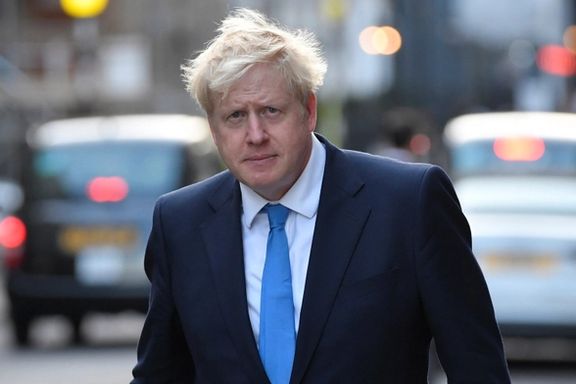
British Prime Minister Boris Johnson warned Iran on Tuesday that time was running out to salvage a 2015 nuclear accord with major powers.

British Prime Minister Boris Johnson warned Iran on Tuesday that time was running out to salvage a 2015 nuclear accord with major powers.
In a call with Israeli Prime Minister Naftali Bennett, Johnson discussed the ongoing talks on the Iran nuclear deal in Vienna.
"The prime minister said the UK wants to see the negotiations in Vienna lead to full restoration of the JCPOA, but that we need Iran to engage in good faith," a Downing Street spokesman said. "The diplomatic door is open, but time is running out to reach an agreement."
European participants in the talks, the UK, France and Germany have been warning Iran that the talks cannot drag on.
Iran interrupted the Vienna negotiations to restore the JCPOA in June for five months and returned to talks in late November. Diplomats say so far, some limited progress has been made but major issues remain to be solved.
In the meantime, Iran continues high-level uranium enrichment, deepening concerns that it might be aiming to build more leverage as it gets closer to building a nuclear bomb.
Talks continue in Vienna with different delegations holding bilateral and multilateral discussions. Iran’s chief negotiator Ali Bagheri-Kani Tuesday met with Russia’s envoy Mikhail Ulyanov, but the contents of the talks have not been disclosed.
With reporting by Reuters
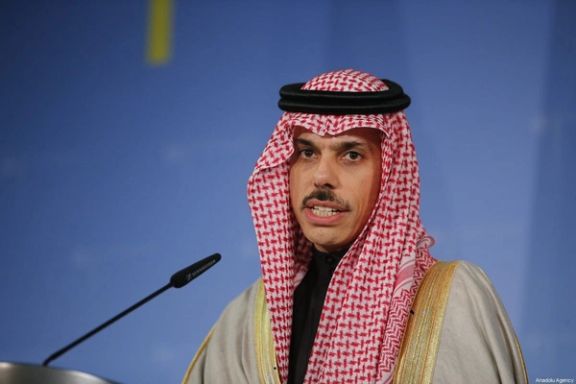
Saudi Arabia’s Foreign Minister Prince Faisal bin Farhan Al Saud has expressed concerns over “transgressions by Iran”, particularly in its nuclear program.
According to al-Arabiya, the visiting Saudi diplomat made the remarks at a joint press conference with Greek Foreign Minister Nikos Dendias in Athens on Tuesday.
Prince Farhan pointed out that Iran's activities don’t match with what Tehran declares about “the peaceful nature” of its nuclear program.
He reiterated Saudi Arabia’s support for international efforts to prevent Iran from acquiring nuclear weapons, as Tehran and world powers are negotiating over the revival of their nuclear agreement in Vienna.
Bin-Farhan said that he explained to his Greek counterpart "the Houthi group's threat to international navigation, the latest example of which was the hijacking of a civilian shipat sea."
The Saudi minister made similar comments after his meeting with his Jordanian counterpart Ayman al-Safadi in Amman on Monday, stressing “the importance of intensifying efforts to prevent Iran from acquiring nuclear weapons and make the Middle East free of weapons of mass destruction.”
Riyadh and Tehran held talks last year to reduce tensions with the aim of restoring diplomatic ties broken since January 2016. So far, the talks have been exploratory with no tangible results.

Concerns about Russia's role in the Vienna nuclear talks have opened a Pandora's box as Iran’s President Ebrahim Raisi plans to visit Moscow.
Diako Hosseini, a senior international relations advisor at the Center for Strategic Research under President Hassan Rouhani, said Russian negotiators had “cunningly” sidelined Enrique Mora, the senior European Union official chairing formal talks in Vienna between remaining signatories of the 2015 nuclear deal, the Joint Comprehensive Plan of Action.
In a Clubhouse session held by Khabar Online news website Sunday, Hosseini said that while Russia wanted the JCPOA restored, this was not based on Iran’s interests but because military confrontation between the United States and Iran, should the talks fail, would not be in Moscow’s interests.
In a commentary Tuesday in Shargh, a reformist newspaper, former diplomat Javid Ghorbanoghli accused Mikhail Ulyanov, the senior Russian negotiator in Vienna, of interfering in Iran's affairs for claiming Russia and China had convinced Iran to make concessions in the talks.
Ulyanov, who amid a general news blackout has been an active Tweeter, last week entered the debate as to whether current talks – which include formal and informal sessions within the JCPOA structure, and indirect contact with the US, which left the JCPOA in 2018 – are based more on drafts developed by June or on written proposals Iran submitted on November 29.
Speaking to Entekhab news website, Shahriyar Heydari, a member of the parliament's National Security and Foreign Policy Committee, also criticized Ulyanov, demanding an explanation from Ali Bagheri-Kani, Iran's top negotiator. "As far as we know, our negotiation team insists on the country's demands and has not changed its stances."
While Iran has since talks began back in April insisted that formal meetings remain within JCPOA structures and be committed to restoring the 2015 agreement, some in Tehran have argued for direct contacts with the US, as occurred for two years leading up to the JCPOA being signed in 2015.
Ulyanov and representatives of the western European JCPOA signatories – France, German and, the United Kingdom – all meet US officials. The Russian envoy has Tweeted photos of his meetings with White House officialRobert Malley, who leads Washington’s team in Vienna.
"The public's reading of this photo [of Ulyanov and Malley] … naturally implies a paternalistic Russian role in the Vienna talks," Ghorbanoghli said. "Moscow is (and was) concerned that the nuclear deal could be the starting point for improvement in Iran and US relations," Ghorbanoghli wrote, adding that in his view both Russia and Israel preferred Tehran-Washington antagonism to continue as it restricted Iran's options.
In an interview leaked in April, Mohammad Javad Zarif, then foreign minister and an architect of the JCPOA, criticized Russia’s role over the agreement and pointed to the absence of Russian Foreign Minister Sergei Lavrov in the group photo taken after the deal was signed.
Zarif, who was sanctioned by the US in 2019, said he resorted to "rude and non-diplomatic language" with Lavrov on some occasions.In August, conservative former lawmaker Ali Motahari said Russia was trying to sabotage the Vienna talks to prevent Iranian rapprochement with “the West.”
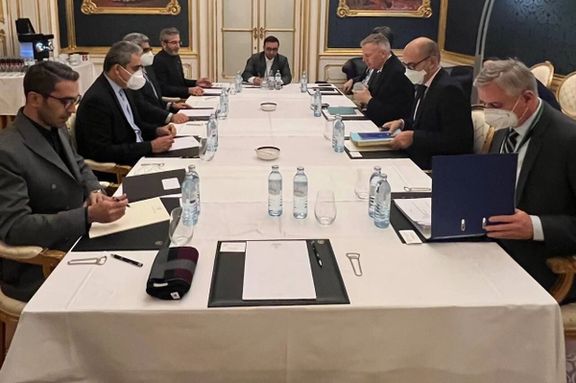
Iran's Chief negotiator Ali Bagheri-Kani has met with the European Union’s representative at the Vienna talks, Enrique Mora, and envoys of the three European participants in the 2015 nuclear deal, Iran’s official news agency IRNA reported.
The second leg of the eighth round of the negotiations started Monday as the participating parties have returned to the Austrian capital after the New Year holidays and consultations with their respective capitals.
According to the negotiating teams, the sides were also engaged in unofficial talks and exchanging messages during the three-day recess, IRNA said.
During the Monday meetings, the participating teams continued discussions on the possible roadmap for revival of the July 2015 nuclear deal, also known as the JCPOA.
Earlier in the day, Iran's foreign ministry spokesman Saeed Khatibzadeh said that Western negotiators have backed off from their "maximalist demands”.
The emphasis on the Western side's "retreat" is apparently a reaction to the Iranian media's criticism of the negotiating team after the Russian envoy to the talks, Mikhail Ulyanov, said that Russia and China had convinced Iran to back off from some of its "maximalist demands" in the last round of talks.
Nour News which is affiliated with the secretary of Iran's Supreme National Security Council (SNSC), Ali Shamkhani, Sunday admitted that Iran had dropped some of its previous demands but accused the media of misinterpreting the facts.
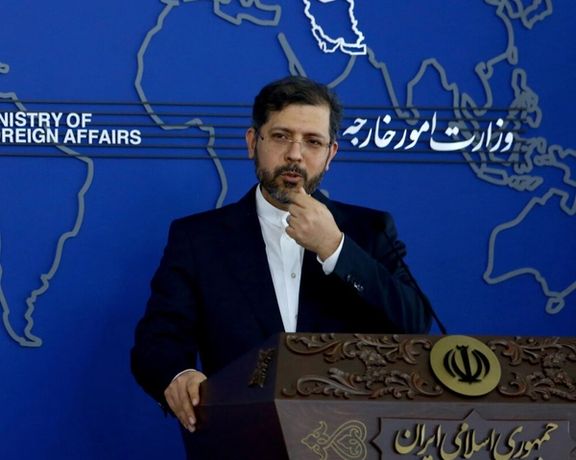
Iran's foreign ministry spokesman said Monday that Western nuclear negotiators in the Vienna talks have backed off from their "maximalist demands".
"If we have a shared text, it is because the Western side realized it had to back off from its maximalist demands. Today we witness the retreat, or I'd better say realism, of the Western sides in the negotiations," Saeed Khatibzadeh said in his press conference Monday morning.
Khatibzadeh reiterated that the West cannot have any demands other than those directly related to the nuclear issue and the 2015 nuclear deal, Joint Comprehensive Plan of Action (JCPOA) or lift the sanctions in a more limited way than they committed to in the deal. He reiterated that the window of opportunity to make a deal will not remain open forever.
Although it was clear from the beginning that the Vienna talks were focused on finding ways to restore the Joint Comprehensive Plan of act (JCPOA), the United States and its three European allies in the talks are also concerned about Tehran’s ballistic missiles and its interventions in the Middle East. There have been references in the past few months of the West asking Iran to agree to discuss these issues after the JCPAO talks, but Tehran has adamantly refused.
The stress on the Western side's "retreat" is apparently a reaction to the Iranian media's criticism of the negotiating team after the Russian envoy to the talks, Mikhail Ulyanov, said Russia and China had convinced Iran to back off from some of its "maximalist demands" in the last round of talks.
Nour News which is affiliated with the secretary of Iran's Supreme National Security Council (SNSC), Ali Shamkhani, Sunday admitted that Iran had dropped some of its previous demands but accused the media of misinterpreting the facts.
Russia's proactive role in the talks reflected by Ulyanov's quite frequent tweets and interviews, and photos of his meetings with the US Special Representative for Iran, Robert Malley, have become quite controversial in Iranian media and social media in recent weeks.
Many have criticized the Iranian negotiating team for conversing with the US side through the Russian envoy when they could directly negotiate with the US. Khatibzadeh responded to such criticisms by stressing that Iran and the US communicate through the European Union envoy Enrique Mora, the talks' coordinator, and exchange ‘non-papers’. "There have been no verbal messages."
The Russian envoy said on December 29 that the US and Russian delegations had "close consultations and coordination in the course of the Vienna talks" and called such coordination a prerequisite for progress towards restoration of the JCPOA. He also tweeted a photo of a meeting of all JCPOA participants, minus Iran, and the US.
"We have nothing to do with how 4+1 (France, Britain, Russia, China and Germany) communicate with the US, or whether they follow a shared mechanism or individual. We never ask them," Khatibzadeh said when asked about the Ulyanov-Malley meeting.
Khatibzadeh added that bilateral and multilateral talks among the participants in the talks are not unprecedented and not exclusive to the Russian team and attributed the attention drawn to Ulyanov and Russia's role in the talks to the extensive tweeting of Ulyanov whose posts are picked up by the press.
"The Russian envoy is very active in social media and has sometimes made statements that he [had to] correct two hours later," Khatibzadeh said.
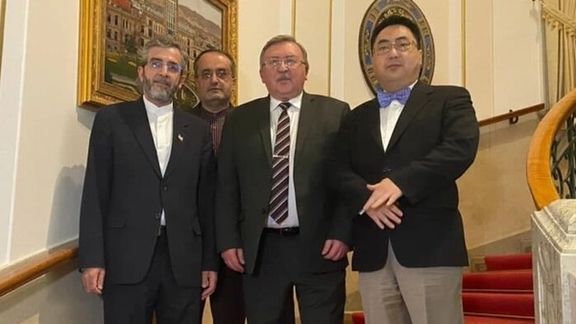
A state-affilliated website in Iran has admitted that Russia and China have "convinced Iran to drop some of its maximalist demands" in the Vienna nuclear talks.
Nour News which is affiliated with the secretary of Iran's Supreme National Security Council (SNSC), Ali Shamkhani, made the admission in an editorial Sunday headlined "Why Russia and China's Assistance To Iran Is Misrepresented by Media".
Mikhail Ulyanov, the Russian envoy to the talks, said this week that Russia and China convinced Iran to drop some of its "maximalist demands" and that Iran has accepted to negotiate on the basis of the text drawn up during earlier rounds of talks conducted by the Rouhani administration in the spring.
"[The media] present [Ulyanov's] statement, which is true, in a manner that causes a wrong interpretation by its audience," Nour News wrote referring to Ulyanov's revelations. Nour News also admitted that the text being negotiated is the same text previously agreed on -- which Tehran's new negotiating team at first insisted had been dropped – but said the new proposals have been incorporated into it.
"One of the cases that erroneously forms part of these controversies is the claim that the Iranian [negotiation] team is being led by the Eastern bloc, particularly Russia, in the talks", the editorial said while claiming that it is in fact Iran that has managed to encourage Russia to work alongside Iran and "pave the way to a good deal".
Tehran presented two new documents with new demands on November 29 when the Vienna talks to revive the 2015 nuclear deal, Joint Comprehensive Plan of Action (JCPOA) reconvened. European sides to the JCPOA – France, Germany, and Britain – rejected the move saying that Iran had gone back on all the progress made during April-June negotiations. US officials claimed that even Russia and China had been disappointed with Iran's action.
The Nour News editorial accused political rivals of fueling controversies over the role of Russia and China to overshadow upcoming visits to Moscow and Beijing by President Ebrahim Raisi and Foreign Minister Hossein Amir Abdollahian. They want to weaken the Raisi administration's " grand strategy of Looking to the East" to prove that Iran must align itself with the West, the website said.
The policy of relying on Asia or the East, particularly China and Russia, was promulgated by Supreme Leader Ali Khamenei in 2018, with the catchphrase, “Looking East”. Since then, his hardliner followers have made it one of the centerpieces of a ‘revolutionary economy’.
Meanwhile, in an editorial Sunday entitled "Excessive Demands of the US in Vienna", the official news agency (IRNA) said the United States is hampering the talks despite "recent progress and acceptance of Iran's demands of verifying the lifting of sanctions and assurance that the US will not renege from the nuclear deal again". US officials are reintroducing demands not related to the JCPOA and causing slowness in the talks, the website claimed, but did not mention any specific announcements by Washington.
"Bringing up issues such as the Islamic Republic's missiles and regional activities, particularly during [nuclear] talks, shows that Washington is trying to achieve its non-JCPOA aims through the nuclear talks," IRNA wrote and alleged that Western powers are using the media to exert pressure on Iran.